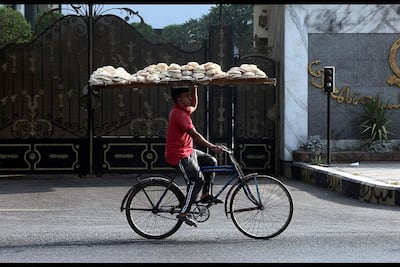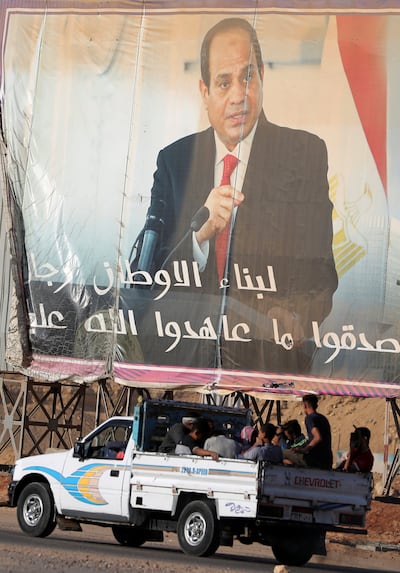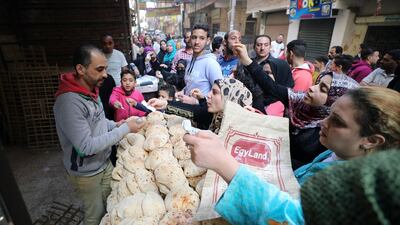In Egypt, bread is called “eish" in Arabic, meaning life.
The name reflects the significance that the staple holds in every meal of the nation's poor majority. Egypt is the world’s biggest consumer of bread and the largest importer of wheat.
It is little wonder, then, that the nation of 100 million felt a shudder go down its spine when President Abdel Fattah El Sisi talked about raising bread prices.
Maintaining low prices through costly subsidies has been a pillar of socio-economic policies adopted by successive governments over the past half century.
So much so that the inexpensive flat bread loaf called “eish balady” is widely thought to have played a significant role in seeing the nation through trying times.
“Keeping bread affordable to the poor has for 60 years been something of an informal social contract between citizens and the political authority,” sociologist and author Ammar Ali Hassan said.
“The symbolism associated with the loaf of bread goes well beyond it being just a consumer item. In reality, it defines the bond between people and the state.”
Mr El Sisi’s government spends 87.5 billion pounds ($5.57bn) subsidising food items for the 66.7 million Egyptians covered by state-issued ration cards.
Half of that money goes into bread subsidies, with each person entitled to five loaves at 0.05 pound apiece a day.
Meeting demand for bread has meant that Egypt is annually topping up its wheat production of 9 million tonnes with about 12 million tonnes it imports.
The nation consumes between 150 and 180 kilograms of bread per capita, well above the global average of 70 to 80 kilograms.

Egyptian officials have for years complained that bread subsidies burdened the national budget, denied successive governments scarce funds to overhaul the economy and encouraged waste and abuse.
An attempt to raise the price of bread in 1977 by president Anwar Sadat sparked days of deadly riots across much of Egypt, leading him to order the army to patrol the streets of Cairo and other major cities.
Successive governments have since used other methods to try to reduce the subsidies bill, such as reducing the size of the loaf, curtailing its production or suspending ration cards if their holders were found to be making enough money.
Mr El Sisi, in office since 2014, has been the architect and driving force behind an ambitious and far-reaching economic reform programme.
His government has zealously lifted subsidies on a wide range of goods and services, including fuel, electricity and drinking water.
It also introduced taxes including value-added and property tax, along with higher charges for items such as phone connections, passports and driving licences.
While the reforms won accolades from bilateral donors and international financial agencies, they added significantly to the hardships faced by most Egyptians.
This was despite government efforts to cushion the poorest from what amounted to the steepest rise of prices in living memory.
The reforms, as far-reaching as they were, did not touch bread, a reflection of the political sensitivity associated with the item.
Protests against the price rises led to some protests, but they were small and swiftly dealt with.
“Some might say, ‘Leave this to the prime minister or the minister of supplies',” Mr El Sisi said of his plans to raise the price of bread. “But no, this one is on me.”
Mr El Sisi refrained from specifying the extent of the increase under consideration. He only reassured Egyptians that the rise would not be steep.
His Cabinet, meanwhile, is reviewing the issue and will make recommendations to him on how to proceed, pro-government media reports say.
Commentators still voiced their concerns.

One such commentator, Ashraf El Barbary, said the assertion that raising bread prices would ease the financial difficulties contrasted with the huge state spending on mega projects.
Mr El Barbary also questioned the argument that money saved from reducing bread subsidies would be used to fund meals for school children.
“Will those school meals compensate for what the pupils eat for the rest of the day, after the number of bread loaves their families are able to buy shrink due to higher prices?” he asked in an unusually outspoken column published at the weekend in Cairo’s daily El Masry El Youm.
“The real problem in Egypt is not raising the price of subsidised bread or even lifting bread subsidies altogether, but it’s rather the government’s vision, which often only sees collecting tax and reducing the services it offers to citizens."
Mr El Barbary’s viewpoint is borne out by some of the widespread eating habits long embraced by the country’s poor majority.
These include stuffing bread with cheap pasta or fried potatoes, which is designed to fill stomachs. Some even eat two or three loaves with just two small pieces of falafel or some cheese.
But the policy of reducing subsidies also has its supporters.
“My words are in the public’s interest and I am prepared to endure all the abuse I will get because … there is a need for reviewing subsidies on all goods,” said Hussein Abu Saddam, the pro-government head of the farmers’ union.
“The time for temporary solutions is up. The Egyptian body needs to be remedied.”


